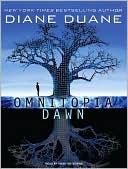 In the middle of the first chapter of Omnitopia Dawn by Diane Duane, I kept thinking “I’ve played this book”. Not “I’ve read this book”, but “I’ve played this book”, as in there’s a game just like this. And there is. The beginning of the book is from the perspective of a player in an extremely immersive massively multiplayer online world that is so detailed that at first the reader doesn’t realize that the perspective is inside a game. Then, he steps back into “real” life, and you realize he was playing his character, and this book is about the game.
In the middle of the first chapter of Omnitopia Dawn by Diane Duane, I kept thinking “I’ve played this book”. Not “I’ve read this book”, but “I’ve played this book”, as in there’s a game just like this. And there is. The beginning of the book is from the perspective of a player in an extremely immersive massively multiplayer online world that is so detailed that at first the reader doesn’t realize that the perspective is inside a game. Then, he steps back into “real” life, and you realize he was playing his character, and this book is about the game.
 Several years ago, I played a series of video games that mimicked both a massively multiplayer online world and the player’s online chat experience during the game as it invaded reality. I really thought I was reading dot Hack, which was the game in question. It would have made a pretty good novel. But Omnitopia only started out the same as the game.
Several years ago, I played a series of video games that mimicked both a massively multiplayer online world and the player’s online chat experience during the game as it invaded reality. I really thought I was reading dot Hack, which was the game in question. It would have made a pretty good novel. But Omnitopia only started out the same as the game.
Omnitopia Dawn, dot Hack, and also, surprisingly, Fantasy in Death by J.D. Robb, all have an element in common, that of using video gaming worlds to affect the so-called “real” world. But J.D. Robb uses the next step in virtual reality as a murder weapon. In dot Hack, the theme is mind control. But Omnitopia Dawn is much more deeply layered. The company behind the game is intended as a jab at high tech companies with their own internal geek culture, like Apple, Google, and even Microsoft back in the day.
But in Omnitopia Dawn, the real world is going to be affected in real ways, not virtual ones. Real competitors of the corporation behind Omnitopia plan to use the launch of the next upgrade to launch a very real attack on Omnitopia’s servers using very real viruses, denial of service attacks and other tools that read like natural progressions from today’s headlines. And the intent behind these attacks is to steal very real money from the company, and if possible to drive Omnitopia out of business, so that its competitors win.
Under the fantasy layer, and the business layer, there is a science fiction layer. Omnitopia’s server network is vast and its founder has programmed it with its own individual persona and artificial intelligence. The new upgrade to the system has caused something unexpected to happen to that artificial intelligence. It has, like so many systems before it, become self-aware. And in the attack launched by Omnitopia’s enemies, it starts to defend itself.
 The first self-aware machine I remember reading about was Mike in Heinlein’s The Moon is a Harsh Mistress. Not all of Heinlein’s adult works wear well because some of his attitudes about women (among other things) were very definitely of his time and not ours. But I still remember the character of Mike very fondly. Mike named himself for Mycroft Holmes. But Mike was the computer that ran all the systems on the moon, and eventually accreted enough memory, inputs, data, whatever to become sentient. Two things about Mike stuck with me. His friend, Manny, teaching him about humor and jokes, the difference between funny once and funny always, and that Mike doesn’t live to see the revolution he brings about.
The first self-aware machine I remember reading about was Mike in Heinlein’s The Moon is a Harsh Mistress. Not all of Heinlein’s adult works wear well because some of his attitudes about women (among other things) were very definitely of his time and not ours. But I still remember the character of Mike very fondly. Mike named himself for Mycroft Holmes. But Mike was the computer that ran all the systems on the moon, and eventually accreted enough memory, inputs, data, whatever to become sentient. Two things about Mike stuck with me. His friend, Manny, teaching him about humor and jokes, the difference between funny once and funny always, and that Mike doesn’t live to see the revolution he brings about.
There was a long moment at the end of Omnitopia Dawn where I was afraid I was reading about Mike again.
